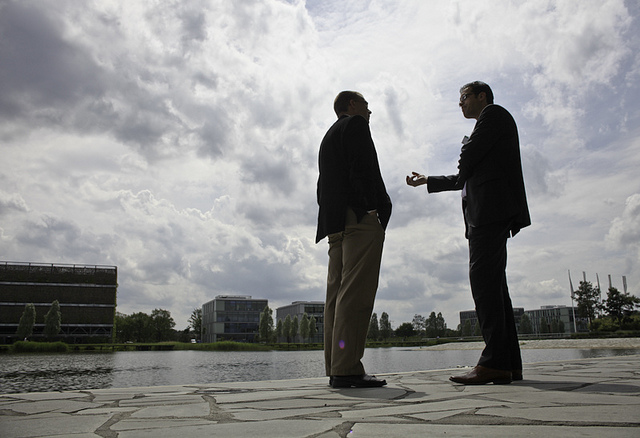How the Greats Master the Art of Conversation
We have conversations with other people every day. Depending on the day and our line of work, we might speak with dozens of people throughout the day. But out of all those appointments, meetings, phone calls, and hallway greetings, we might have just one or two really genuine, one-on-one conversations that last more than a few minutes.

Whether during a scheduled lunch meeting, impromptu drinks after work, or cherished time spent with friends or family, it is in those longer conversations that you have the opportunity to really influence the person or persons with whom you are speaking. Now is the time to “wow” them with your quick wit, interesting background, impressive stories, and excellent sense of humor.
Right?
Wrong. A subtle but very significant characteristic of highly successful people isn’t their ability to lead and control a conversation, but their ability to listen. Truly listen.
What Listening Looks Like
In an article for Fast Company several years ago, bestselling author Marshall Goldsmith shared this story:
“Two highly accomplished lawyers are sitting at the bar at Sparks Steakhouse in New York. One is my friend’s lawyer, Tom, the other is Tom’s law partner, Kevin. They’re having a leisurely drink, waiting for their table to open up. Sparks is a landmark steakhouse where a handful of New York’s rich, powerful, and glamorous are in attendance most nights. On this night, the A-list name is superstar attorney David Boies, who argued the U.S. government’s case against Microsoft. He makes a beeline to the bar to say hello to Kevin, whom he knows from previous cases.
Boies joins Tom and Kevin for a drink. A few minutes later, Kevin gets up to make a phone call outside. Boies remains at the bar, talking to Tom for 30 minutes. ‘I’d never met Boies before,’ Tom said. ‘He didn’t have to hang around the bar talking to me. And I have to tell you, I wasn’t bowled over by his intelligence, or his piercing questions, or his anecdotes. What impressed me was that when he asked a question, he waited for the answer. He not only listened, he made me feel like I was the only person in the room.’”
Goldsmith went on to point out that Boies wasn’t trying to “score points,” or get something from Tom, but was simply doing something that came naturally to him.
“In showing interest, asking questions, and listening for the answers without distraction, Boies was simply practicing the one skill that has made him inarguably great at relating to people.”
3 Ways to Be a Better Listener
So how do you master the art of conversation like Boies and other highly successful leaders and achievers? Here are three simple but key ways you can practice this skill:
- Remove distractions. Give the other person your full attention. Look them in the eyes and tune out other distractions. Avoid glancing at your phone or watch. Be willing to ignore incoming phone calls and postpone reading or answering text messages and emails.
- Don’t interrupt. Quell the urge to finish someone’s sentence or to cut in with a related anecdote from your own experience. Let them finish their train of thought, and don’t assume you know what they’re going to say next.
- Focus on what they’re saying, not what you’re thinking. When the other person is speaking, avoid the temptation to formulate what you want to say next. Ask questions and maintain your end of the dialogue, but make it your aim to let the other person shine throughout the conversation.
Goldsmith concluded his article by stating,
“Your only aim is to let the other person feel that he or she is important… You may feel like a dullard as you listen quietly, but invariably the other person will say, ‘What a great guy!’ You’d say the same thing about anyone who made you feel like the most important person in the room.”
Have you ever experienced a conversation like this? What other tips would you give for being a great listener and making others feel like the most important person in the room?

